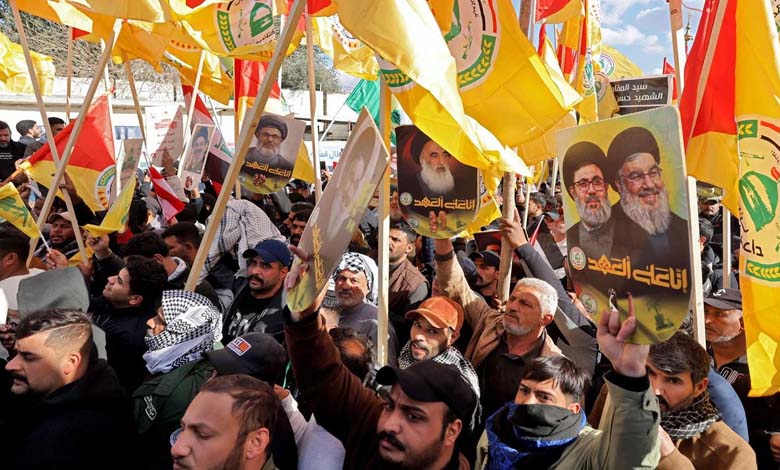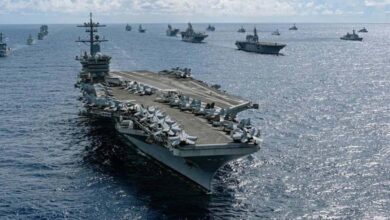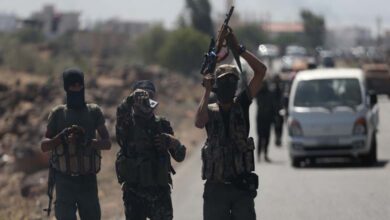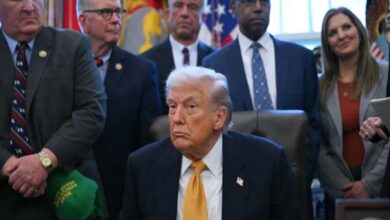After a Defeat… Hezbollah Now Ties the Decision to Go to War to the Lebanese State

Naïm Qassem’s statement signals the re-emergence of the Lebanese state as a player capable of curbing any military adventurism — viewed as a shift in the balance of power between official institutions and the party.
-
Lebanon Dismantles Hezbollah Network with Israeli Support
-
Israel Announces Killer Beam to Counter Hezbollah
In a notable and unprecedented shift in Hezbollah’s rhetoric, its deputy secretary-general, Sheikh Naïm Qassem, announced that the decision to go to war is now “linked to the decision of the Lebanese state.” This marks a significant change in the party’s approach to issues of war and peace, which have long symbolized its independence from state institutions.
In a televised speech delivered on Thursday, Qassem stated that the party is “ready to fight at the border,” but tied this readiness to an official decision from the Lebanese government. He added, “If the Lebanese state decides today to expel Israel by force and launch a battle, we are ready to fight at the border.”
-
Hezbollah’s Footprints in the Heart of Sanaa: Ṣarif Explosion Exposes Iran’s Missile Network
-
Hezbollah courts Trump with a language of interests: from the Great Satan to investment opportunities
He went on to say that Hezbollah “will not submit to dictates, will not surrender, and will struggle for a proud homeland for future generations, no matter the cost,” describing Israel as an “expansionist entity” seeking regional domination with American support.
Qassem’s comments represent a “qualitative shift,” as it is the first time Hezbollah has openly acknowledged that the decision to engage in war with Israel may no longer rest solely with the party, but instead lie with the state’s institutions. For decades, Hezbollah has waged its wars inside and outside Lebanon independently of the Lebanese government and army — a stance that has drawn strong local and international criticism, portraying the group as an armed faction operating outside Lebanese legal authority.
-
How Did Israel Target Hezbollah Leaders? Details Emerge to Unveil the Mystery
-
Religious Chant Leader Accused of Spying for Israel and Bringing Down Hezbollah Officials
This change appears to follow the 2024 war with Israel, during which Hezbollah’s limited options became clear — either due to the significant losses it suffered or its refusal to enter the larger confrontation between its ally Iran and Israel in June. This gave rise to widespread perceptions that Hezbollah can no longer escalate militarily without state approval or that it now faces mounting internal and external pressure.
The September 2024 war between Israel and Hezbollah, sparked by a major military escalation, resulted in over 4,000 deaths and around 17,000 injuries, according to official figures. Although a ceasefire was reached in November, Israel continued to violate it and only partially withdrew from southern Lebanon, retaining control of five Lebanese hilltops.
-
Hezbollah’s Violations Rekindle Tensions at the Syrian-Lebanese Border
-
Dismantling of Most of Hezbollah’s Military Sites in Lebanon: Flexibility or Manoeuvre?
The war exposed the extent of Hezbollah’s human and organizational losses, including the deaths of key field commanders — among them its former secretary-general Hassan Nasrallah — and the destruction of major security and military infrastructure in the south. This posed a serious test of the party’s military strength and its image among supporters.
In June, during a series of tit-for-tat strikes between Israel and Iran, Hezbollah’s absence from the battlefield raised numerous questions about why it refrained from joining its key regional ally. Some interpreted this as evidence of the party’s diminished capacity to fight on multiple fronts or, at the very least, its subordination to the Lebanese state’s will — which, for the first time, seemed capable of preventing the country from being dragged into a war unwanted by most of its citizens.
-
The future of Hezbollah’s weapons is open for discussion: Under conditions
-
Hassan Bdeir : Hezbollah Leader Targeted by Israeli Airstrike in Beirut
Observers note that this stance has temporarily strengthened the Lebanese state’s role as a force able to restrain military adventurism — seen as a sign of a shift in the balance of power between state institutions and Hezbollah, or at least the beginning of an internal reassessment within the party regarding when, where, and how to engage in conflict.
Despite Qassem’s talk of full readiness, realities on the ground suggest otherwise. Hezbollah is more cautious, and the Lebanese public less willing to bear the consequences of a new war. The last confrontation cost the party dearly — both politically and militarily — which may push it to maintain a confrontational discourse without engaging in actual conflict, in an effort to preserve a delicate balance.
It seems that Hezbollah, while not abandoning its strategy of resistance, is increasingly aware that the calculus has changed — and that war is no longer a decision that can be made in Beirut’s southern suburbs alone, but must now — even nominally — pass through the Lebanese state.
-
Hamas Hezbollah and Houthis: Netanyahu Unveils His Vision to End the Gaza War
-
Mossad Reveals How the Pager Explosions Shifted the Course of the War against Hezbollah
-
The Secrets of Funding: Israel Warns of Smuggling Operations for Hezbollah












